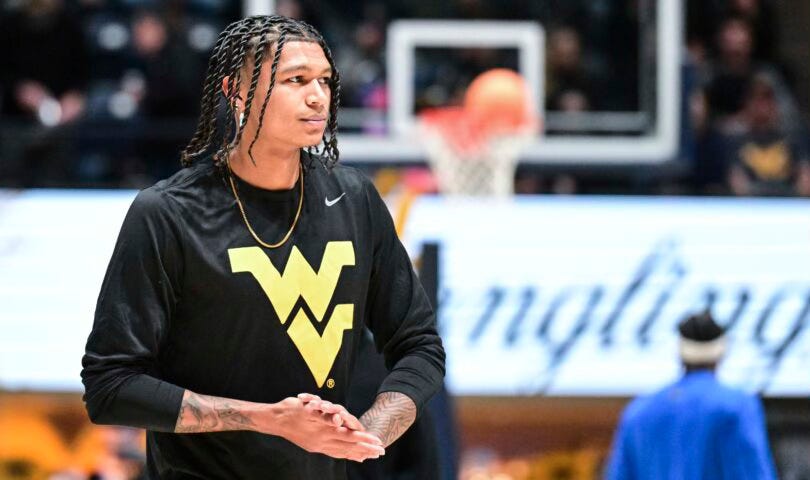In a courtroom clash that could potentially reshape the landscape of college athletics, the State of Ohio recently squared off against the NCAA in a federal court hearing. The NCAA's eligibility rule has greatly impacted athletes, spotlighted by high profile case of two-time transfer RaeQuan Battle to West Virginia University (WVU).
The NCAA's eligibility rule is yet another restriction imposed on athletes who transfer more than once. The State of Ohio, challenging the fairness of these restrictions, sought a court-imposed restraining order to challenge the status quo and help redefine the rights of student-athletes.
Meet RaeQuan Battle
RaeQuan Battle, a student-athlete from WVU, finds himself at the center of this legal storm having transferred twice. Battle's case embodies the challenges and uncertainties faced by student-athletes navigating the intricate web of NCAA eligibility rules. The hearing delved into the specifics of Battle's situation, exploring the potential repercussions of the NCAA's rules on his collegiate career.
Like any other athlete, RaeQuan Battle came to West Virginia University to play basketball. His journey started at the University of Washington before transferring to Montana State. As coaching shifts become an inherent part of the college sports landscape (which The Athletes’ Advocate has been vocal about), athletes often find themselves facing unexpected transitions. Whether due to a coach's departure or a program-wide restructuring, these changes can leave athletes grappling with the challenge of adapting to new leadership.
For many athletes, the decision to transfer is deeply intertwined with their aspirations. The departure of a coach who played a pivotal role in their recruitment and development can prompt athletes to reassess their goals, leading them to explore opportunities that align more closely with their evolving visions for success.
In a deeply personal and poignant letter released earlier this month, Raequan Battle opened up about the reasons behind his decision to choose WVU, including building relationships with current WVU coaches. The heartfelt message went into various aspects of his life, shedding light on pivotal moments that shaped his path. It included tragedies to close people in his life and impact of not playing to his mental health. In this letter, he also addresses the challenges he faced, including the loss of his coach at Montana, a significant event that undoubtedly influenced his collegiate choices.
The 14-Day Game Changer in NCAA Transfer Rules
Ohio Attorney General Dave Yost has successfully obtained a 14-day temporary restraining order from a federal judge, challenging the NCAA rule that mandates transfers to sit out for a season for two-time transfers before playing for their new college team.
With the temporary restraining order in effect, athletes currently in the process of seeking waivers may now find themselves immediately eligible to transfer. The impact of this decision extends beyond college basketball, reaching into the realm of college football, where the transfer portal window is open.
While this temporary restraining order is a significant step, it forms part of an ongoing legal tussle between several states and the NCAA. The unfolding legal proceedings will be closely monitored for potential implications beyond the initial 14-day duration. Surely, it lead to confusion as many of the NCAAs decisions have proven. The reliance on the myth of amateurism in a billion dollar industry should continues to be challenged.
We believe that athletes—just as coaches and others in the college sports world—should have freedom of movement. Athletes should be afforded the similar rights as those paid in this system. The transfer waivers that have been issued appear arbitrary and, in some cases, issued due to political or public pressures. What gets lost is the best interest of the athlete. The same individuals who pour their blood, sweat, and tears (and provide great value, revenue, and entertainment for the NCAA) are the same ones that the NCAA is fighting legal battles to keep them from playing. The athletes are the lifeline of the entire apparatus. Meanwhile, athletes like Battle suffer from mental health and get one of the most important things taken from them.
The pending weeks and months will hopefully provide clarity on this issue that the NCAA botched. We will see if they get it right as they try to ameliorate. To borrow from the NCAA’s vignette a the end of the college basketball’s NCAA tournament, it is now the NCAA’s ‘One Shining Moment.’




